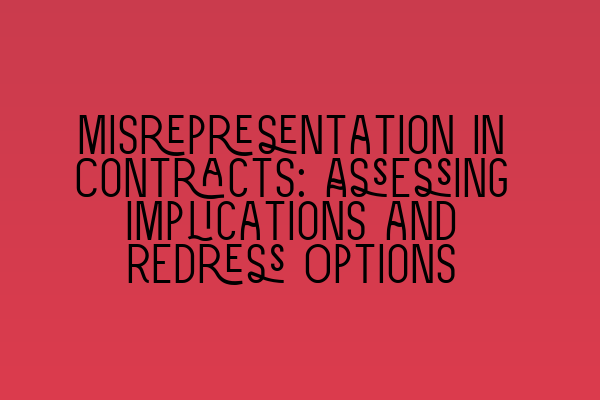Misrepresentation in Contracts: Assessing Implications and Redress Options
Introduction
When entering into a contract, it is essential to have a clear understanding of the terms and representations made by all parties involved. Misrepresentation, a term commonly used in contract law, refers to false statements or misleading information that can impact the validity and enforcement of a contract. In this blog post, we will explore the implications of misrepresentation in contracts, the different types of misrepresentation, and the available options for redress.
Types of Misrepresentation
1. Innocent Misrepresentation
Innocent misrepresentation occurs when a party unknowingly makes a false statement during the negotiation of a contract. Despite the lack of intention to deceive, innocent misrepresentation can still have significant consequences. The innocent party may be entitled to a remedy, such as rescission, where the contract is canceled, and the parties are returned to their pre-contractual position.
2. Negligent Misrepresentation
Negligent misrepresentation, on the other hand, involves a false statement made without reasonable care and attention to its accuracy. If a party relying on the misrepresentation suffers financial loss, they may be able to seek damages as a remedy. However, the claimant must prove that:
– The misrepresentation was made
– The misrepresentation was false
– The other party was negligent in making the false statement
– The claimant suffered a loss as a consequence
3. Fraudulent Misrepresentation
Fraudulent misrepresentation is the most serious type of misrepresentation as it involves a deliberate and knowingly false statement made with the intention to deceive. In such cases, the aggrieved party may seek remedies such as rescission, damages, or both. It is important to note that fraudulent misrepresentation can lead to criminal liability in addition to civil remedies.
Implications of Misrepresentation
Misrepresentation can have significant implications for the validity and enforceability of a contract. If a representation influenced the decision of a party to enter into a contract and that representation is later discovered to be false, the injured party may have grounds to challenge the contract. This can result in the contract being voidable, meaning it can be set aside as if it never existed.
Redress Options
1. Rescission
Rescission is a remedy available to the innocent party in cases of misrepresentation. It allows the injured party to cancel the contract and be restored to their pre-contractual position. When seeking rescission, it is crucial to act promptly and communicate the desire to cancel the contract as soon as the misrepresentation is discovered.
2. Damages
In cases where a party has suffered financial loss due to misrepresentation, they may seek damages as a form of redress. The aim of damages is to compensate the innocent party for any losses they have incurred as a result of the false statement. The amount of damages awarded will depend on various factors, including the extent of the loss and the foreseeability of the loss at the time of the contract.
3. Specific Performance
In certain circumstances, the court may order specific performance as a remedy for misrepresentation. This remedy requires the defaulting party to fulfill their obligations under the contract. However, specific performance is a discretionary remedy and will only be granted if it is deemed equitable and feasible.
Conclusion
Misrepresentation in contracts can have far-reaching implications for all parties involved. Understanding the types of misrepresentation and the available options for redress is essential for protecting your rights and interests in contractual relationships. If you have been affected by misrepresentation, it is advisable to seek professional legal advice to explore the appropriate course of action.
For further information on contract law and related topics, we recommend checking out the following articles:
– Interpreting Contractual Clauses: Unlocking the Hidden Meanings
– Agreements in Contract Law: Understanding Its Various Types
– Essentials of Consideration: Understanding the Basis of Contractual Exchange
– Contract Law Tutorials: Simplifying Complex Concepts for Students
– Discharge of Contracts: Modes and Consequences Explained
Remember to always consult a qualified solicitor for tailored advice based on your specific circumstances.
